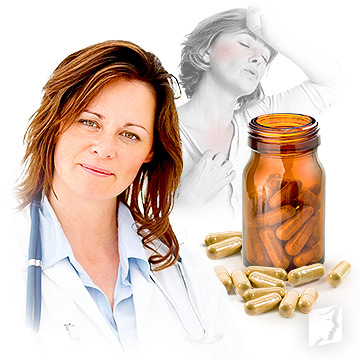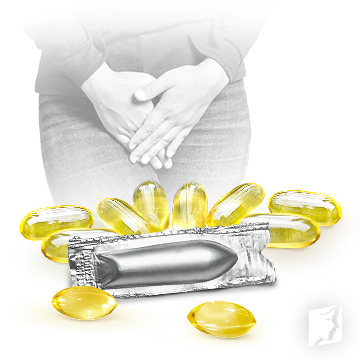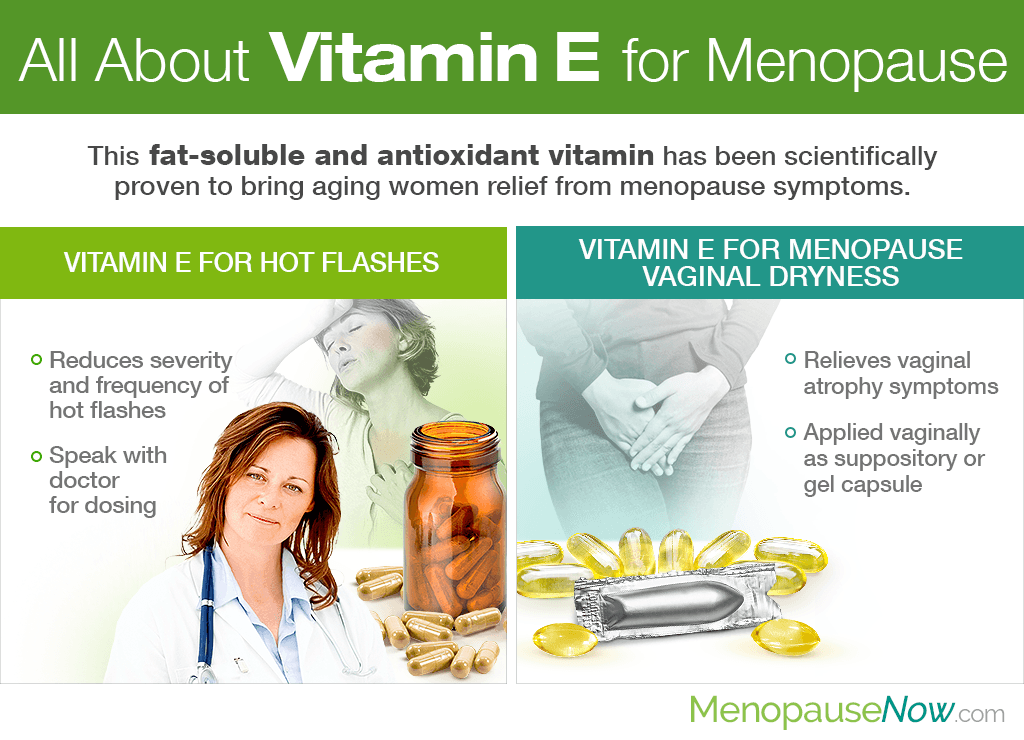Vitamin E for menopause symptoms is praised day in and day out for its effectiveness. Nevertheless, in order to reap the most of its benefits, women should educate themselves on exactly how it can help them during this transformative time.
Continue reading to learn more about vitamin E for menopause, including basic facts about the vitamin and two most renowned symptoms it can help relieve.
About Vitamin E
Vitamin E is a fat-soluble vitamin that acts as an antioxidant, protecting cells from the damage of free radicals. It comes in many forms, but alpha-tocopherol is the only form a human body can use.
Aside from being an antioxidant, vitamin E also enhances immune function and prevents clots from forming in the cardiovascular system.
Women are recommended to obtain 15 mg of vitamin E daily, or 22 IU, from a diet.1 Foods rich in the vitamin include plant-based oils, like those derived from wheat germ or sunflower; nuts, such as hazelnuts and almonds; seeds, including sunflower seeds; vegetables, like spinach and broccoli; or fruits of kiwi and mango.
Vitamin E for Hot Flashes

Vitamin E has traditionally been used throughout the years for hot flash relief in menopause, and for good reason.
The fat-soluble vitamin has been scientifically proven to reduce the severity and frequency of hot flashes in women who are menopausal.2
Because a potential risk of bleeding, the dosage of vitamin E supplementation for hot flash relief should be prescribed by a doctor.
Vitamin E for Menopause Vaginal Dryness

Furthermore, vitamin E has also been acclaimed for helping women battle vaginal dryness.
In one recent study, vitamin E suppositories were found to relieve vaginal atrophy symptoms in postmenopausal women, providing a safe alternative to hormone replacement therapy (HRT).3
Vitamin E oil is also available in gel capsules to combat feminine dryness. Women may insert a pierced capsule directly into the vagina or squeeze the gel onto their finger before applying.
Further Considerations
While vitamin E benefits for menopause are many, there are other essential nutrients middle-aged women should incorporate into their diet for menopause in order to make sure they are fueling their aging bodies properly.
Further vitamins and minerals for menopause symptom relief and optimal well-being include vitamin D, B vitamins, calcium, and magnesium, among others. Each plays an instrumental role in nourishing the body in preparation for entrance into its last reproductive stage.
However, menopausal women should also look to effectively manage menopause symptoms by treating the underlying cause. In most cases, it is hormonal imbalance.
Natural and effective menopause symptom treatments focus on promoting overall endocrine system health through lifestyle changes and alternative medicine, such as phytoestrogenic herbal supplements - like black cohosh or red clover - or hormone-regulating supplements, including Macafem.
By nourishing the body from the inside out with these practical, wholesome methods, women can conquer their bothersome symptoms for good.
Sources
- Harvard T.H. Chan School of Public Health. (n.d.). Vitamin E. Retrieved September 17, 2019, from https://www.hsph.harvard.edu/nutritionsource/vitamin-e/
- Mayo Clinic. (2018). Hot flashes: Diagnosis & treatment. Retrieved September 17, 2019, from https://www.mayoclinic.org/diseases-conditions/hot-flashes/diagnosis-treatment/drc-20352795
- Memorial Sloan Kettering Cancer Center. (2017). Improving Your Vulvovaginal Health. Retrieved September 17, 2019, from https://www.mskcc.org/cancer-care/patient-education/vaginal-health
- Siteman Cancer Center. (n.d.). Vaginal Dryness. Retrieved September 17, 2019, from https://siteman.wustl.edu/treatment/survivorship/vaginal-dryness/
Footnotes
- National Institutes of Health. (2019). Vitamin E. Retrieved September 17, 2019, from https://ods.od.nih.gov/factsheets/VitaminE-HealthProfessional/
- Ziaei, S. (2007). The effect of vitamin E on hot flashes in menopausal women. Gynecologic and Obstetric Investigation, 64(4), 204-207. doi: 10.1159/000106491
- Emamverdikhan, A.P. et al. (2016). A survey of the therapeutic effects of Vitamin E suppositories on vaginal atrophy in postmenopausal women. Iranian Journal of Nursing and Midwifery Research, 21(5), 475-481. doi: 10.4103/1735-9066.193393

